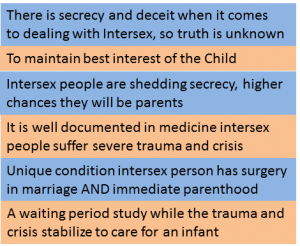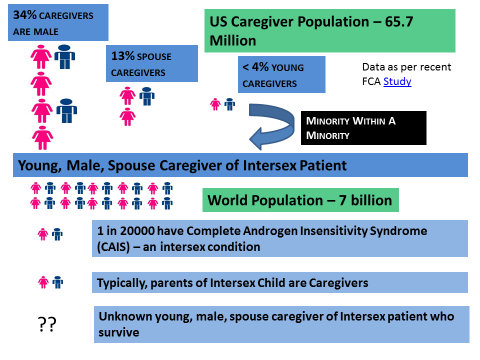 It is not the purpose of this group to advocate or disallow anyone from having children. The intention here is to have a healthy discussion with valid information like establishing a “waiting period” in the best interest of the child and for a healthy relationship of a person with AIS. Androgen Insensitivity Syndrome (AIS) is a condition that affects sexual development before birth and during puberty. People with this condition are genetically male. They may have female sex characteristics or signs of both male and female sexual development. The idea is to let the facts digest and have an honest discussion to arrive at a logical and sensible conclusion. Too many decades have gone by using a concealment-based approach through secrecy and lying using confusion and fear-mongering tools. It is time to change and time to start addressing real problems instead of concealing. When a person is under severe trauma, crisis and stress, is it appropriate to be a primary care provider for an infant?
It is not the purpose of this group to advocate or disallow anyone from having children. The intention here is to have a healthy discussion with valid information like establishing a “waiting period” in the best interest of the child and for a healthy relationship of a person with AIS. Androgen Insensitivity Syndrome (AIS) is a condition that affects sexual development before birth and during puberty. People with this condition are genetically male. They may have female sex characteristics or signs of both male and female sexual development. The idea is to let the facts digest and have an honest discussion to arrive at a logical and sensible conclusion. Too many decades have gone by using a concealment-based approach through secrecy and lying using confusion and fear-mongering tools. It is time to change and time to start addressing real problems instead of concealing. When a person is under severe trauma, crisis and stress, is it appropriate to be a primary care provider for an infant?
It is a fact that intersex or AIS patients cannot have biological children, sad but scientifically true. When they want to have a lovely child, the options are to have someone else’s child. Adoption is a widely utilized approach. There are several guidelines that multiple think tanks and governments have arrived at for adoption including well-being of adoptive parent, the non-biological parent. There are specific laws both at country level and international level which regulate adoption. There is a “homestudy” approach required in an adoption case. If a person needs glasses for corrected vision, the government regulates and makes mention of it on the driver’s license. Similarly, in the best interest of the child and as a public health issue, it is prudent to conduct a scientific study to establish the rules for a non-biological parent to be the primary care provider for the child. Is is NOT prudent to use an “under the radar” approach and making it a sole responsibility of the biological parent – also a caregiver of an AIS patient simultaneously. The young and inexperienced caregiver needs help and guidance and wisdom of the many. That is where the society needs to step in and provide a waiting period study. What are the bioethics for the innocent infant and the unknowing caregiver to protect them?
Waiting Period Study
There are several research reports and known medical knowledge that AIS or intersex people may opt to have sex reassignment surgery (SRS). As part of the continuing treatment plan, the AIS patient goes on hormone replacement therapy (HRT). In addition, the treatment also calls for appropriate psychosexual counseling due to the medically diagnosed severe trauma and crisis. To the best of our knowledge, there are NO studies available of evaluating an adult AIS patient undergoing a SRS, HRT and immediately being a primary care provider for an infant. The “waiting period” we are discussing here is this unique situation. In absence of data, what reliable information do we have to base the final decision on? As a caregiver having witnessed this highly unique and unprecedented situation first hand, it is imperative to have a “waiting period study” and save future lives of infants and the other parent. Typically, AIS patients who choose to have surgery is at or around puberty. Or some AIS patients may choose to not have the surgery and subsequent hormone therapy at all. This “waiting period” would not be applicable to them. It is not the suggestion that AIS patients having surgery in adulthood, way after puberty, should not have children. We need to understand when an intersex person who undergoes surgery and hormone treatment have overcome the personal trauma and crisis. The intent here is to have a truthful scientific study so that appropriate options can be evaluated in the best interest of a child.
There are studies which have discussed issues of “Gender-related behaviors, namely childhood play, peer association, career and leisure time preferences in adolescence and adulthood, maternalism, aggression, and sexual orientation”. Would there be similar characteristics in an intersex person under severe trauma and crisis when they initially undergo Hormone Replacement Therapy right after the Sex Reassignment Surgery in adulthood while in a marriage? The reasons maybe different but the resulting symptoms are similar. Symptoms of HRT include depression, irritability, fatigue, mood swings, hot sweats in addition to the trauma and crisis identified due to the intersex condition. Is this a condicive environment to be raising an infant with love, care, patience? The severe trauma and crisis may have symptoms akin to Post Traumatic Stress Disorder (PTSD). Is there any study on this area? Unfortunately, due to NO studies available in this unknown area, there are no valid guidelines either and much like the intersex condition is treated with secrecy. As humans, we all want to do the right thing and give a child to an infertile person but let’s not do it at the cost of the infant and their biological parent – the caregiver. Let us make sure that the infant and the caregiver biological parent of the infant are equally protected. The BIG difference being there is an innocent infant and an unknowing caregiver involved now. What about the innocent infant’s best interest and the other parent – the caregiver’s best interest? It will also assist the intersex person in having a healthy relationship with the partner.
The sad commentary here is that because of the traditional concealment based approach and the secrecy and lies it utilizes, it is difficult to get a true, unbiased, scientific study and credibility is at stake. The so-called subject matter experts may be more about saving their reputation and special interest groups may be more about establishing their agenda and unfortunately, the “best interest of the child” may be lost or secondary. Today there are no special safety or health guidelines for the primary caregiver of AIS. There is no proper crisis or trauma management given to caregivers of AIS. Is it fair to ask them to be solely responsible for having a biological child and offer no help to them? Is it fair to the innocent child? In our zeal to recognize intersex or AIS patients as female who are infertile, are we forgetting the innocent infants and caregivers? Is there a violation of the human rights of innocent infants and caregivers in order to “right” a genetic condition.
Looking Ahead for Intersex Waiting Period Study
While today the world is still knee deep in controversial issues like fair and equal rights of LGBTI, we are discussing a world after that. We are looking into the future when LGBTI rights are equal. Then intersex people will no longer have to live a life of secrecy and lies. At that point, how best do we get “normalcy” in everyone’s life. Not just the intersex person, but also their caregiver, their children, and the entire ecosystem. Today, we are still in a world where bringing up LGBTI is a polarizing issue. Today, we are still in a world when mentioning LGBTI in any way brings intimidation and bias. Once we move past that, we can have an honest and logical discussion about a “waiting period study” for intersex or AIS patients when they have SRS and go on HRT in adulthood and immediately have to care for an infant. Truth always prevails and is the right long term solution. By having an inclusive approach, we will make a better world for ourselves and our future generations to come.
Should there be a waiting period established for the treatment to stabilize before caring for the child?
| Event | Majority Women | Intersex patient surgery during marriage |
|---|---|---|
| Puberty Starts and Estrogen Hormones Onsets | At age 12 (natural) | At age 27 (With Aid of HRT) |
| Has a new born infant and be a primary care provider for | At age 13 | At age 28 |
| Conventional Wisdom on being a Primary Care Provider in this condition? | What do you think? | What do you think? |
| Has a new born infant after almost a decade on hormones | At age 21 | At age 36 |
| Conventional Wisdom on being a different parent in this condition? | What do you think? | What do you think? |





 Facebook
Facebook GooglePlus
GooglePlus RSS
RSS Twitter
Twitter